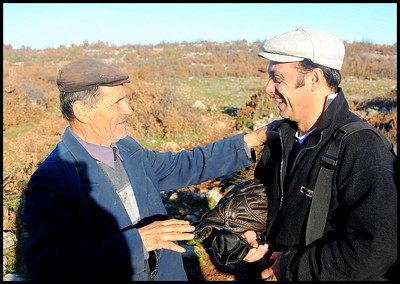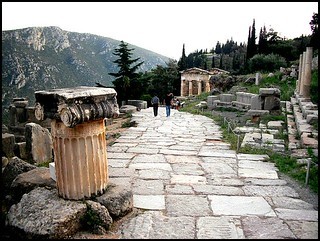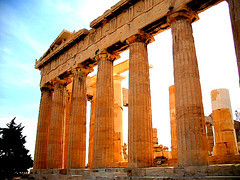Tasters from ‘The Migrant’ novel.

A pastor sets off on a dangerous journey to find a missing Albanian member of his church in Athens at the time of Greece’s economic crisis, encountering police brutality, racism and restored relationships along the way.
In an Albanian village. (Chapter 2.)
As the route became tarmac, an old man in a blue cloth
cap sat on an upturned milk crate at the gate of his yard.
He scrutinised Jude and raised his hand in a clenched fist
salute to greet and halt him.
‘Death to fascism!’ he shouted.
‘Freedom for the people,’ Jude called back to humour
him. He knew old Fatos had at one time been the village
headman, and still kept up his self-appointed monitoring
duties.
‘Where is your permit to be here?’ said Fatos.
‘Where is your permit to ask people if they have a
permit?’ asked Jude. The man slapped his knee and
laughed. ‘How are you, Fatos? And everyone in your
house?’
‘Mirë, mirë,’ he said. Jude walked over and smiled at him
as he shook his hand, and kept on moving. He then spun
around and saluted him again with his fist. The man
grinned broadly.
On the roads south through Greece. (Chapters 7 and 9).
Soon they were through Kozani and driving out in open
country, and Jude watched the scenery slide by. There
were solar panels the size of billboards in fields flashing in
the midday sun. A lorry was parked with the entire cabin
tilted forwards as if it had expired in the heat. As they
climbed into the hills, they passed clusters of Orthodox
shrines along the roadside like rusty mailboxes. One was a
perfect miniature church with red roof tiles and a bell
tower.
South of Larissa the landscape began to change. Jude
watched an irrigation machine like a giant stick insect
creeping over a field, and a tractor racing across another,
raking up a dust cloud behind in a brown jet stream. They
passed a meadow of green grass that rolled up to its crest
in a wave where a single cypress tree flew there like a
standard. It reminded Jude a little of Salisbury Plain in
England, and he half-expected a tank to rise up at the
roadside on war manoeuvres.
They drove on in an atmosphere that had warmed, Jude
thought, a few degrees. They came over a pass and to a
long, winding descent past walls with huge red slogans for
the Greek Communist Party. They drove by Eleonas, a
village of white houses above an escarpment of orange-tinged
rocks, and down through olive orchards with long
avenues of gnarled trunks. As they climbed towards
Delphi, the cypress trees lined the road like javelin heads,
and when they passed its sanctuary of Apollo, a place
pagans once thought of as the navel of the world, the light
was beginning to fade with the sun.

In Athens (Chapters 12 and 16).
Omonia.
They walked under a graffiti-soiled colonnade
where women in hijabs crouched around babies in
pushchairs, and there Jude noticed a sign above a door that
read ‘St Kolbe’s Refugee Programme’.
‘Let’s see if our spiritual cousins might help us,’ Jude
said to Mehmed. On the third floor in a dimly lit, spartan
office they were eventually given entry to the room of a
Father O’Toole, as the name read on the door.
‘Are you relatives?’ he said in the soft, arching lilt of
southern Ireland as he squinted a little at the photo.
‘I’m his pastor,’ said Jude. ‘We’re from Albania – and
you, Cork?’
‘Galway … You don’t look like a pastor,’ he said
smiling. ‘You look like a Romantic poet. Shelley or one of
them … or something.’
‘We have no union card. I could recite the Beatitudes to
you?’
‘That won’t be necessary,’ he said, laughing, and
pushed his lank, grey hair behind his ear. ‘And your friend
– is he Mafia?’ He glanced at Mehmed.
‘He’s a church elder.’
‘Oh, God save us from you Protestants. And you’d be
looking for your lost sheep here like a good fella, would
you?’
‘In a nutshell.’
---
Acropolis.
Now is not the time,’ said Mehmed. ‘Look there.’ Jude
followed the line of Mehmed’s sight until he saw four men
walking through the trees on the approach path to the
Propylaea steps and ramp. The second man wore a red
baseball cap and the first had an unmistakably thick neck
and a black bandana. ‘We did not lose them yesterday,’
Mehmed said, glancing up the steps behind him. ‘They’ve
picked their time and place, Jude, and caught us well, with
no exit. Come on … quickly.’ Mehmed pulled him
forwards and they set off striding up the steps onto a
wooden boardwalk. As they broke into a run, Jude heard
the heavy clump of his footfall passing by the weatherworn
stone columns, and it seemed to call unwanted
attention to them. Mehmed was propelling himself
forwards by the metal handrail. Soon, they were on a
gravel path running on to the citadel hilltop past the long
line of honey-hued Doric columns that formed the
towering Parthenon temple.

From ‘The Migrant’ © Paul Alkazraji 2019, Instant Apostle.
Read Chapter 1 of ‘The Migrant’ here:
https://instantapostle.com/2019/02/22...
Find copies of ‘The Migrant’ here: https://www.amazon.co.uk/gp/product/B...

No comments have been added yet.



